-
 Bitcoin
Bitcoin $83,979.3595
1.13% -
 Ethereum
Ethereum $1,853.8179
0.36% -
 Tether USDt
Tether USDt $0.9999
0.01% -
 XRP
XRP $2.0788
-0.87% -
 BNB
BNB $598.5730
-1.59% -
 Solana
Solana $124.0889
-1.41% -
 USDC
USDC $0.9999
-0.01% -
 Dogecoin
Dogecoin $0.1684
-0.57% -
 Cardano
Cardano $0.6674
-0.67% -
 TRON
TRON $0.2371
0.70% -
 Toncoin
Toncoin $3.9719
-4.13% -
 Chainlink
Chainlink $13.4530
-1.42% -
 UNUS SED LEO
UNUS SED LEO $9.3902
2.16% -
 Stellar
Stellar $0.2656
-0.28% -
 Avalanche
Avalanche $18.8988
-2.47% -
 Sui
Sui $2.3249
0.58% -
 Shiba Inu
Shiba Inu $0.0...01216
-4.42% -
 Hedera
Hedera $0.1631
-0.68% -
 Polkadot
Polkadot $4.0513
-1.67% -
 Litecoin
Litecoin $81.7663
-3.07% -
 MANTRA
MANTRA $6.2099
-1.17% -
 Bitcoin Cash
Bitcoin Cash $303.9438
-1.33% -
 Bitget Token
Bitget Token $4.5618
-0.56% -
 Dai
Dai $1.0001
0.03% -
 Ethena USDe
Ethena USDe $0.9999
0.02% -
 Pi
Pi $0.6922
-3.63% -
 Hyperliquid
Hyperliquid $12.9724
-3.69% -
 Monero
Monero $216.4384
-0.58% -
 Uniswap
Uniswap $6.0466
-0.10% -
 Aptos
Aptos $5.2354
-1.19%
Why are mining income far from expectations?
Mining profits often fall short due to crypto price volatility, rising mining difficulty, high electricity costs, hardware depreciation, and fees from pools and transactions.
Mar 29, 2025 at 11:01 am
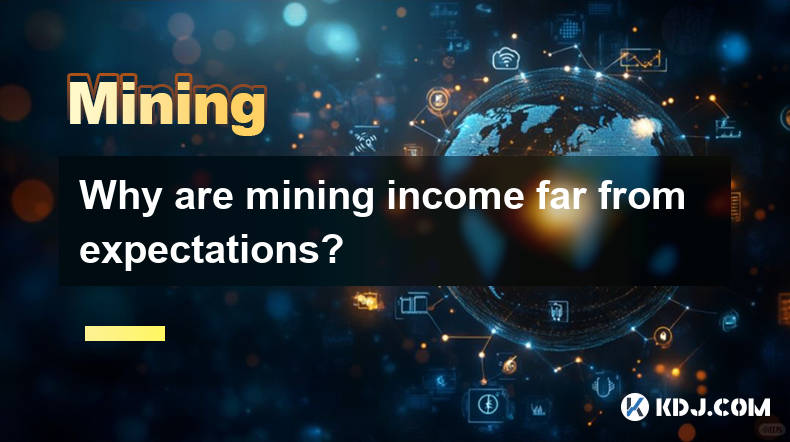
Understanding the Discrepancy Between Expected and Actual Mining Profits
Mining cryptocurrencies, while potentially lucrative, often falls short of initial projections. This discrepancy stems from a confluence of factors, many of which are dynamic and difficult to predict accurately. Understanding these factors is crucial for managing expectations and mitigating potential losses.
One major factor is the volatility of cryptocurrency prices. The value of your mined cryptocurrency fluctuates constantly, impacting your overall profit. A drop in price can significantly reduce your earnings, even if your mining hash rate remains consistent. Careful price tracking and risk management strategies are essential.
Another key aspect is the increasing difficulty of mining. As more miners join the network, the computational difficulty of solving cryptographic puzzles increases. This means you need more powerful hardware to maintain a consistent mining rate, potentially increasing your operational costs. This difficulty adjustment is a fundamental part of the blockchain's security mechanism.
The cost of electricity is a significant, often overlooked, expense. Mining consumes substantial energy, and electricity prices vary widely geographically and seasonally. High electricity costs can quickly erode profits, especially for less efficient mining operations. Choosing a location with low energy costs is a crucial factor in profitability.
Hardware costs also play a substantial role. The initial investment in mining equipment, such as ASICs or GPUs, can be significant. Moreover, these machines have a limited lifespan and may require frequent replacements or upgrades to stay competitive. Depreciation and maintenance should be factored into your cost analysis.
Network fees, or transaction fees, are another factor to consider. These fees, paid to miners for processing transactions, can vary depending on network congestion. High transaction fees can reduce your net profit, especially when mining less popular cryptocurrencies. Understanding these fees and their potential impact is important.
Finally, pool fees can eat into your earnings if you're mining in a pool. Mining pools combine the hashing power of multiple miners, increasing the chances of finding a block and earning rewards. However, pools typically charge a fee for their services, which reduces your share of the block reward. Choosing a pool with competitive fees is vital.
Detailed Breakdown of Contributing Factors
Let's delve deeper into some of these key areas:
Electricity Costs: The electricity consumption of mining hardware is substantial. Calculate your kilowatt-hour (kWh) cost and multiply it by your hardware's power consumption to determine your daily electricity expense. This cost should be factored into your profit calculations.
Hardware Costs and Depreciation: ASICs and GPUs are expensive, and their value depreciates over time. Consider the initial purchase price, the expected lifespan, and the potential resale value when calculating your return on investment. Factor in potential repair costs.
Mining Difficulty: The difficulty adjusts dynamically to maintain a consistent block generation time. An increase in difficulty means that it takes more computational power to mine a block, reducing your chances of earning a reward. Monitor the difficulty of your chosen cryptocurrency.
Pool Fees: Mining pools usually charge a percentage of your mined rewards as a fee. Research different pools and compare their fee structures before joining one. Lower fees directly translate to higher profits.
Software and Maintenance: You'll need mining software and may need to pay for maintenance and repairs. Include these costs in your calculations. Regular software updates are also crucial for maintaining efficiency and security.
Addressing Specific Scenarios
Let's examine some specific scenarios where mining income might fall short of expectations:
Scenario 1: Investing in outdated hardware: Purchasing older, less efficient mining equipment can lead to significantly lower profitability due to increased energy consumption and reduced hash rate compared to newer models.
Scenario 2: Ignoring electricity costs: Underestimating electricity costs can severely impact profitability. Accurately calculating and budgeting for electricity is crucial.
Scenario 3: Choosing a less profitable cryptocurrency: Not all cryptocurrencies are equally profitable to mine. Some may have lower block rewards or higher difficulty, resulting in lower earnings.
Scenario 4: Selecting a pool with high fees: High pool fees can significantly reduce your net income. Thoroughly research different pools and choose one with competitive fees.
Scenario 5: Failing to account for hardware depreciation: Ignoring hardware depreciation can lead to an inaccurate assessment of profitability. Factor in depreciation costs for a realistic picture.
Frequently Asked Questions
Q: How can I accurately predict my mining income?
A: Accurate prediction is difficult due to the volatility of cryptocurrency prices and mining difficulty. However, using mining calculators that factor in electricity costs, hardware specifications, and pool fees can provide a reasonable estimate. Regularly monitor these variables to adjust your expectations.
Q: What are the best cryptocurrencies to mine in terms of profitability?
A: The most profitable cryptocurrency to mine depends on several factors, including hardware, electricity costs, and current market conditions. Research current mining profitability calculators and compare different coins. Remember that profitability can change rapidly.
Q: How can I reduce my mining costs?
A: Reduce costs by choosing a location with low electricity rates, using energy-efficient mining hardware, joining pools with low fees, and regularly maintaining your equipment to prevent premature failure.
Q: Is cloud mining a viable alternative?
A: Cloud mining can offer a lower barrier to entry, but it also carries risks such as scams and potentially lower returns compared to direct mining. Thoroughly research any cloud mining provider before investing.
Q: What should I do if my mining income is significantly lower than expected?
A: Analyze your costs, including electricity, hardware, and pool fees. Consider upgrading your hardware, switching to a more profitable cryptocurrency, or joining a different mining pool. Monitor market conditions and adjust your strategy accordingly.
Disclaimer:info@kdj.com
The information provided is not trading advice. kdj.com does not assume any responsibility for any investments made based on the information provided in this article. Cryptocurrencies are highly volatile and it is highly recommended that you invest with caution after thorough research!
If you believe that the content used on this website infringes your copyright, please contact us immediately (info@kdj.com) and we will delete it promptly.
- Arctic Pablo Coin (APC) Explodes onto the Meme Coin Market as One of the Best New Meme Coins to Invest in
- 2025-04-02 14:35:12
- Cardano (ADA) Navigates a Critical Phase as Bulls Attempt to Stabilize Price
- 2025-04-02 14:35:12
- Vaulta Banking Advisory Council Triggers EOS Price Rally to 2-Month High
- 2025-04-02 14:30:12
- XRP Price Prediction: Will XRP Bounce or Break Down From This Key Support Level?
- 2025-04-02 14:30:12
- Bitcoin is not just a price rollercoaster. It is also a living ecosystem
- 2025-04-02 14:25:12
- Bandai Namco Amusements Europe releases A Minecraft Movie plush toys
- 2025-04-02 14:25:12
Related knowledge
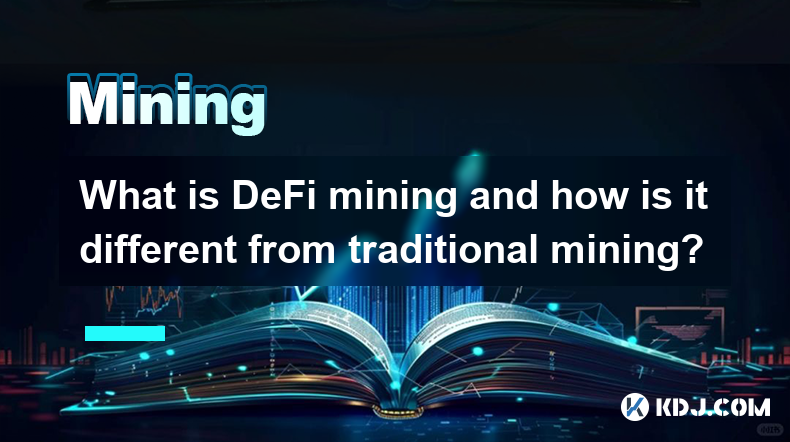
What is DeFi mining and how is it different from traditional mining?
Apr 02,2025 at 09:50am
DeFi mining, also known as yield farming or liquidity mining, is a process within the decentralized finance (DeFi) ecosystem where users provide liquidity to decentralized platforms in exchange for rewards. Unlike traditional mining, which involves solving complex mathematical problems to validate transactions and add them to a blockchain, DeFi mining f...
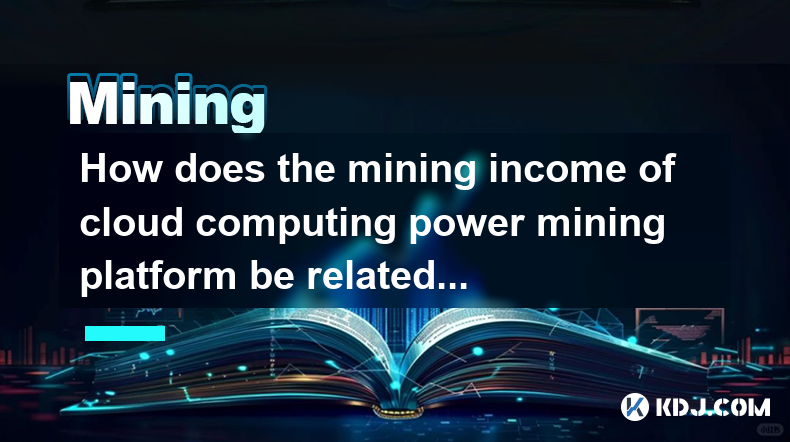
How does the mining income of cloud computing power mining platform be related to mining pool allocation?
Apr 02,2025 at 01:56am
The relationship between the mining income of a cloud computing power mining platform and the allocation of mining pools is a crucial aspect of cryptocurrency mining. Mining income is influenced by various factors such as the efficiency of the mining hardware, electricity costs, and the specific cryptocurrency being mined. However, the allocation of min...
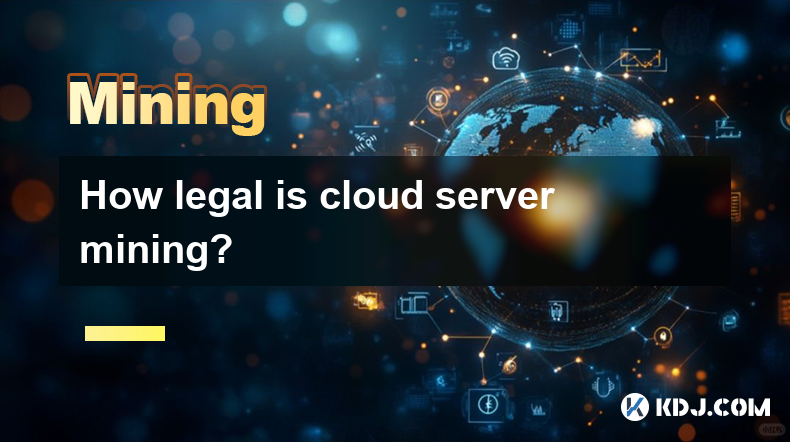
How legal is cloud server mining?
Apr 01,2025 at 08:08am
Cloud server mining has become an increasingly popular method for individuals and companies to participate in cryptocurrency mining without the need for expensive hardware and high electricity costs. However, the legality of cloud server mining can be a complex issue, as it varies by jurisdiction and depends on several factors. This article will explore...
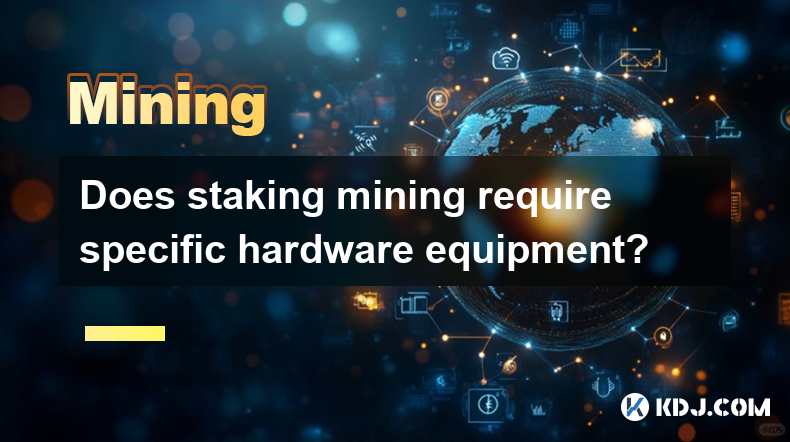
Does staking mining require specific hardware equipment?
Apr 02,2025 at 08:21am
Staking mining, often referred to simply as staking, is a process used by various cryptocurrencies to secure their networks and validate transactions. Unlike traditional mining, which often requires specialized hardware like ASICs (Application-Specific Integrated Circuits) or high-performance GPUs (Graphics Processing Units), staking typically does not ...
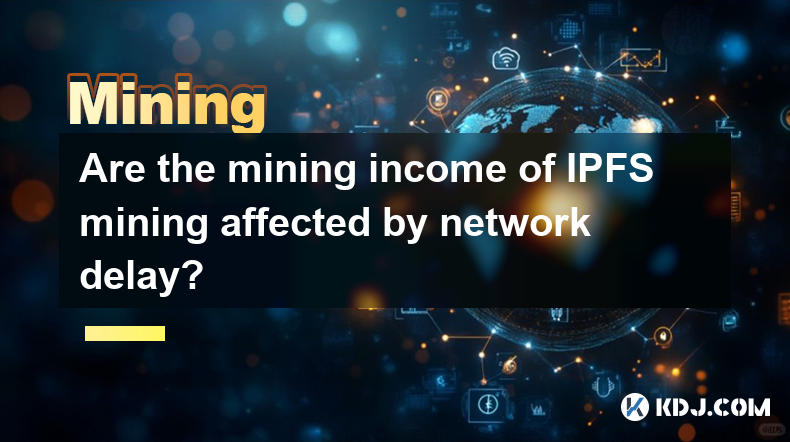
Are the mining income of IPFS mining affected by network delay?
Apr 01,2025 at 09:36pm
Are the Mining Incomes of IPFS Mining Affected by Network Delay? Understanding IPFS Mining and Network Delay's ImpactIPFS (InterPlanetary File System) mining, unlike Bitcoin mining, doesn't involve solving complex cryptographic puzzles. Instead, it focuses on providing storage and bandwidth to the network. Miners earn rewards for storing and sharing dat...
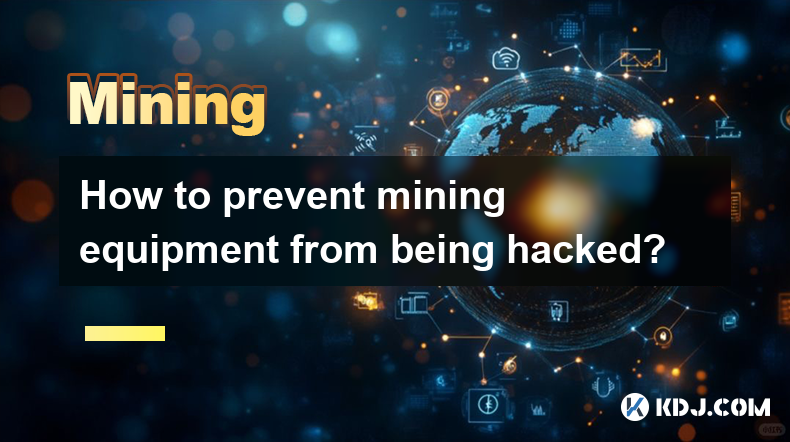
How to prevent mining equipment from being hacked?
Apr 01,2025 at 06:22am
Understanding the ThreatsCryptocurrency mining, while potentially lucrative, exposes your equipment to various cyber threats. These threats range from simple malware infections that steal your mining profits to sophisticated attacks that hijack your entire operation. Understanding these threats is the first step in effective protection. This includes r...

What is DeFi mining and how is it different from traditional mining?
Apr 02,2025 at 09:50am
DeFi mining, also known as yield farming or liquidity mining, is a process within the decentralized finance (DeFi) ecosystem where users provide liquidity to decentralized platforms in exchange for rewards. Unlike traditional mining, which involves solving complex mathematical problems to validate transactions and add them to a blockchain, DeFi mining f...

How does the mining income of cloud computing power mining platform be related to mining pool allocation?
Apr 02,2025 at 01:56am
The relationship between the mining income of a cloud computing power mining platform and the allocation of mining pools is a crucial aspect of cryptocurrency mining. Mining income is influenced by various factors such as the efficiency of the mining hardware, electricity costs, and the specific cryptocurrency being mined. However, the allocation of min...

How legal is cloud server mining?
Apr 01,2025 at 08:08am
Cloud server mining has become an increasingly popular method for individuals and companies to participate in cryptocurrency mining without the need for expensive hardware and high electricity costs. However, the legality of cloud server mining can be a complex issue, as it varies by jurisdiction and depends on several factors. This article will explore...

Does staking mining require specific hardware equipment?
Apr 02,2025 at 08:21am
Staking mining, often referred to simply as staking, is a process used by various cryptocurrencies to secure their networks and validate transactions. Unlike traditional mining, which often requires specialized hardware like ASICs (Application-Specific Integrated Circuits) or high-performance GPUs (Graphics Processing Units), staking typically does not ...

Are the mining income of IPFS mining affected by network delay?
Apr 01,2025 at 09:36pm
Are the Mining Incomes of IPFS Mining Affected by Network Delay? Understanding IPFS Mining and Network Delay's ImpactIPFS (InterPlanetary File System) mining, unlike Bitcoin mining, doesn't involve solving complex cryptographic puzzles. Instead, it focuses on providing storage and bandwidth to the network. Miners earn rewards for storing and sharing dat...

How to prevent mining equipment from being hacked?
Apr 01,2025 at 06:22am
Understanding the ThreatsCryptocurrency mining, while potentially lucrative, exposes your equipment to various cyber threats. These threats range from simple malware infections that steal your mining profits to sophisticated attacks that hijack your entire operation. Understanding these threats is the first step in effective protection. This includes r...
See all articles

























































































